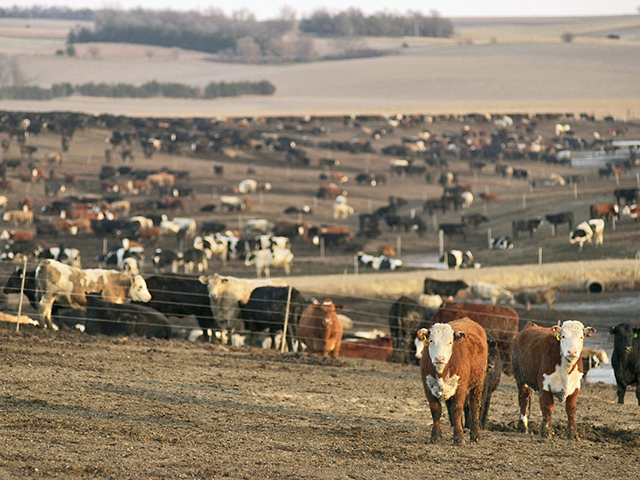Farmers Lose CAFO Case in Michigan
Michigan Supreme Court Sides With State on Expanded Rules for CAFOs
LINCOLN, Neb. (DTN) -- Although the Michigan Supreme Court ruled last week that the state of Michigan was within its power to issue stricter rules for concentrated animal feeding operations, the leading farm group in the state told DTN it disagrees with the ruling.
A legal dispute ensued in March 2020 when the Michigan Department of Environment, Great Lakes and Energy, or EGLE, issued a general permit as part of the National Pollutant Discharge Elimination System program.
The new general permit issued imposed new conditions on farmers in order to comply.
Michigan agriculture interest groups including the Michigan Farm Bureau Federation filed a legal challenge in the state's court of claims, saying the new rules were implemented without following the proper procedures that allow the public to have input.
The state's supreme court didn't agree in its July 31, 2024, ruling.
"Because EGLE (state of Michigan) lacks power to issue rules relating to NPDES permits issued to CAFOs, neither the 2020 general permit EGLE issued pursuant to (federal law) nor the discretionary conditions in that permit can have the force and effect of law," the court's majority opinion said, "and so they cannot be 'rules' as defined by (state law)."
The ag groups argued the state's implementation of new NPDES permit rules was arbitrary and capricious, were unconstitutional and were invalid because state regulators didn't follow procedures to promulgate rules set out in the Michigan Administrative Procedures Act.
Pending changes to the rules, farmers in the state not only have to meet minimum standards under the NPDES permitting program but the state issued several new requirements above and beyond.
Allison Eicher, Michigan Farm Bureau assistant general counsel, told DTN the 2020 general permit still is being reviewed by an administrative law judge.
"We disagree with the Michigan Supreme Court's conclusion," Eicher said in a statement to DTN.
P[L1] D[0x0] M[300x250] OOP[F] ADUNIT[] T[]
"We believe that state government should follow well-established procedures when it issues rules for its citizens. However, we remain committed to supporting environmental safeguards and protection of Michigan's natural resources."
Eicher said the administrative law judge is tasked with determining whether the state's rule is "based on sound science and environmental policy."
The Michigan Supreme Court's decision requires the administrative law judge to determine whether the discretionary conditions in the general permit are necessary to achieve water quality standards or to comply with other laws.
"Our goal is to ensure that state government regulates farms in a manner that protects the Great Lakes in a scientific manner, taking thoughtful consideration of input from experts, farmers and citizens," Eicher said.
COURT OPINION
In its opinion, the Michigan Supreme Court ruled the state has discretionary authority to develop more protective permit conditions than those contained within promulgated rules.
The court also concluded that it is the individual certificates of coverage issued to each facility under the permits that establish binding requirements. Each permit granted to CAFOs are done so in making site-specific considerations.
In a dissenting opinion written by Justice David Viviano, he said the 2020 general permit was not "merely explanatory" and did not interpret any existing statutory language, it instead created "new substantive standards" in implementing the NPDES program.
"The 2020 GP conditions represent a quasi-legislative decision that sets quantitative standards for a category of dischargers," Viviano wrote.
"Like the other factors, this one also weighs in favor of finding that the 2020 GP is a rule because it does not merely explain EGLE's interpretation of uncertain statutory language."
ADDITIONAL PERMIT CONDITIONS
The 2020 general permit imposed new conditions including phosphorous land application limits, setback provisions that require farms to keep a 35-foot-wide vegetated barrier where CAFO waste may not be applied along any surface water of the state, open tile line intake structures, sinkholes and agricultural well heads.
That includes roadside or any ditches that are conduits to surface waters of the state, according to the rules. Exceptions include surface waters of the state that are up-gradient of land applications.
The state also includes a new NPDES permit condition that permit holders are not allowed to apply waste within 100 feet of surface waters of the state or conduits to such waters. In addition, the state also requires a three-month ban for applying waste to land or on transferring waste to other locations from January through March.
The U.S. Environmental Protection Agency delegated the power to administer the NPDES program to the state of Michigan as it does for many states. So, the state promulgated rules for obtaining NPDES permits under the Clean Water Act -- all to achieve certain water quality standards.
Following the high court's decision, Michigan Attorney General Dana Nessel said she is ready to defend the state's position on implementing the new rules.
"This decision is a critical step forward in protecting our state's invaluable water resources," she said in a statement.
"While this is a significant procedural victory for environmental protection, we will continue to vigorously defend EGLE's position and demonstrate the need for these permit conditions in contested cases."
Several environmental groups filed amicus briefs in support of the state. That includes the Environmental Law and Policy Center, the Michigan Environmental Council, the Environmentally Concerned Citizens of South Central Michigan, Freshwater Future, For Love of Water, Food and Water Watch, the Michigan League of Conservation Voters and the Alliance for the Great Lakes.
Todd Neeley can be reached at todd.neeley@dtn.com
Follow him on social platform X @DTNeeley
(c) Copyright 2024 DTN, LLC. All rights reserved.






